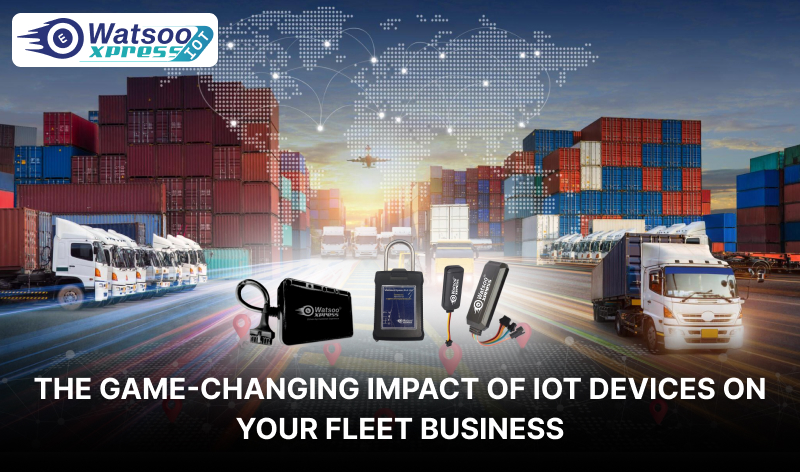Nowadays, IoT technology is gaining high popularity across businesses. It is creating a widespread network by integrating IoT devices into industrial assets worldwide. A modern IoT system involves sensors, internet-enabled devices, advanced software, and necessary technologies. It helps businesses and industries extract the most out of your work. One such field is logistics, which is heavily benefiting from these devices. Fuel sensors, Fleet GPS Tracking Devices, digital locks, etc. are some examples of modern IoT solutions that help logistics industries run smoothly.
So, are you someone who has to manage a fleet across multiple locations for business purposes? In that case, with the help of these solutions, you can track, manage, and optimise their operations all from a single dashboard. Basically, it provides you with the capability to access comprehensive details of your fleet. It helps you in making data-driven decisions. As a result, fleet operations become more efficient and disciplined, saving you a lot of money in the long run.
Today, we will talk about how IoT Fleet GPS Tracking Devices can benefit your business.
Benefits of Fleet GPS Tracking Devices
IoT solutions include advanced innovations that improve the functioning of the transportation sector in various ways, such as
Real-Time Location Tracking
Everyone is aware of the concept of GPS tracking. It is widely used in the transportation sector. Almost every vehicle on the road is equipped with a GPS device that tracks their location and helps drivers navigate the routes. But it transformed when it was connected to the internet via IoT integration.
Now, the Fleet GPS Tracking Devices is not only helping the driver to navigate but also sending real-time data to multiple servers for more advanced calculations. Further, the software calculates the data with AI-powered algorithms to generate detailed reports. These reports are stored as well-organised historical trip records that can be very useful for further optimisation.
Geo-Fencing
Geo-fencing is one of the most useful features for fleet managers for tracking management. With the help of a fleet gps tracking devices, it establishes virtual borders for various physical sites, such as industrial buildings, warehouses, and delivery locations. These borders are crucial in giving us immediate information on the status of these locations.
Subsequently, this enables managers to make quick choices; geo-location can be tailored to the needs of the user through push notifications, schedule messages, and frequent updates. Additionally, geo-fencing is more effective in preventing vehicle theft by sending alert notifications when the vehicle enters or exits the enforced boundaries.
Fuel Management
The costliest aspect of any fleet business is fuel expenditure. Therefore, it becomes significant for them to optimise and manage the fleet fuel efficiently. A fuel sensor connected to a fleet gps tracking devices gives a clear picture of how much fuel your truck uses each day, month, or entire year. Also, this monitoring enables fleet managers to generate comprehensive analytical reports that help optimise fuel consumption across fleets.
In addition, these reports are also helpful in making data-driven decisions on time. Likewise, it helps to prevent fuel theft from vehicles. Whenever the sensor detects any sudden dropouts due to theft, pilferage, or leakage, it triggers immediate alert notifications directed to the owner or the fleet manager’s phone number.
Goods Safety
Another critical factor for fleet businesses is the safety of their goods while in transit. IoT GPS E-Lock can be the ideal solution. You can remotely control these keyless locks wirelessly connected to the internet from anywhere. Goods safety becomes very important when you are dealing with expensive goods transportation.
Moreover, they provide an extra layer of security because they are tamper-proof and send you notifications whenever anybody tries to gain unauthorised access. These locks allow various ways to authenticate access, such as OTP verification, remote access from a distant location, and geo-fenced unlocking.
Driver’s Driving Behaviour Monitoring
It is a fact that if the driver is being monitored constantly, he will drive the vehicle with full discipline. Continuous monitoring with the help of iOT Telematics can significantly reduce the chances of rush driving behaviour on the road. A fleet gps tracking devices not only increases the safety of the vehicle and the driver but also enhances their productivity.
Overall, it leads to efficient engine performance, vehicle sustainability, and optimum fuel utilisation. Moreover, you can get timely alerts whenever the driver breaks harshly or exceeds the maximum speed limit. For a specific time, you can also receive customised driving behaviour reports. It helps to appreciate good driving habits to sustain maximum efficiency.
Customised Reporting
IoT-based solutions offer more precise and sophisticated insights into fleet performance. However, a lot of business owners are implementing IoT technology to increase their profitability with the help of data reports. These reports facilitate comprehensive calculations on certain aspects of the fleet. It includes fuel consumption for a particular trip, the driver’s driving behaviour, and so on.
When you are equipped with accurate reports, you can make effective decisions and increase the profit margins. Above all, IoT telematics like fleet GPS tracking devices and fuel sensors have now become a necessity for fleet businesses worldwide. It is a worthwhile investment that keeps your vehicles productive and increases security along with the profits.
Conclusion
Conclusively, implementing IoT fleet GPS tracking devices, fuel sensors, etc. in your vehicles can be very beneficial for your business. They transform the way you operate on the roads with safety, security, and sustainability. Watsoo’s iOT devices appear to be one of the best choices not only for fleet businesses but also more than the governments of 18 states in India.
Frequently Asked Questions
Q. What is an IoT?
Ans. IoT stands for Internet of Things, and it refers to those internet-enabled devices that facilitate communication between the server applications and the device itself.
Q. What are some examples of IoT devices for vehicles?
Ans. Numerous IoT devices can be beneficial to your business, such as:
- Fleet GPS Tracking Devices
- Load Sensors
- Fuel Level Sensors
- Digital Locks
Q. What are IoT applications for fleets?
Ans. IoT applications are software systems that receive data from the IoT telematics sensors and reflect it on your application dashboard on the computer or mobile screen.


